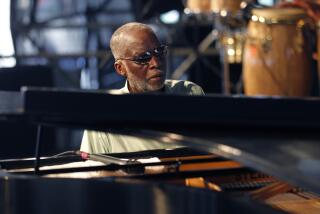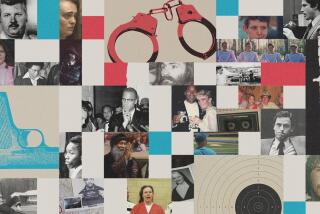Shows Spotlight Abu-Jamal Case
- Share via
Wading through the facts, claims and counter-claims of the notorious murder case of Mumia Abu-Jamal reminds you why the “Rashomon” tale retains its universal power. The Japanese story of various and conflicting eyewitness accounts of a brutal attack can be metaphorically applied to the Abu-Jamal case, which is partly why it still raises hackles 14 years after he was convicted to death for the murder of Philadelphia police officer Daniel Faulkner.
The hackles may reach a crescendo after the Sunday premiere on HBO of British Channel Four’s disturbing film “Mumia Abu-Jamal: A Case for Reasonable Doubt?” and Thursday’s re-airing on Court TV of the film followed by an hour panel discussion, “Fair or Foul?: The Case of Mumia Abu-Jamal.”
As host Arthur Miller’s panel generally agrees, producer-director John Edgington’s documentary is advocacy journalism, open to the claims that Abu-Jamal did not kill Faulkner on Dec. 9, 1981. This standard of British reporting bothers these American viewers, but it is not so far afield from point-of-view reporting on PBS’ “Frontline.” Edgington also gives fair airing to prosecutor Joseph McGill and other police officers, and he points out contradictions in the defense’s case.
Still, Edgington’s answer to his own title is a resounding “yes,” and he lays out a compelling case. The prosecution’s scenario--in which Abu-Jamal allegedly hopped out of the taxi he was driving when seeing his brother William tussling with police, fired at Faulkner, then killed him at point-blank range--is carefully picked apart here. A ballistics report of a .44-caliber shell at the scene doesn’t match Abu-Jamal’s .38-caliber gun. (That report was later dismissed by authorities as “preliminary.”) Basic forensics investigation work, such as checking for gunpowder marks on Abu-Jamal’s hands, was apparently not done. Eyewitness accounts of another man fleeing the scene after firing a gun were not presented during trial.
Enter “Rashomon.” These eyewitnesses not only contradict one another, but one, William Singletary--whose account might be enough to rule out Abu-Jamal as a suspect--was so harassed by police that he withdrew his statement. The hints of police corruption in this case--especially bothersome in a cop killing--appear strong enough to warrant a separate investigation.
But what perhaps stirred Edgington’s interest in a story that’s become a cause celebre for the left is that Abu-Jamal was a veteran investigatory radio journalist, doing Edgington’s kind of advocacy reporting. Since Abu-Jamal’s work with the Black Panther Party, the FBI had compiled an 800-page file on him, and, the film charges, continued to keep him under surveillance up to the time of the murder.
The suggestions of a trumped-up political case are unavoidable in the film, but strangely overlooked in the talky, convoluted Court TV panel discussion. Rarely during this hour are the case’s details addressed, partly because some panelists are not up on the case (as retired New York police forensics expert Vernon Geberth admits). Talk wanders off into the quicksand of O.J. Land or into abstract debates over overburdened public defense attorneys, besieged district attorneys and the social good.
After all of this, legal journalist Stuart Taylor brings things back to earth: Abu-Jamal’s case will be appealed to the Pennsylvania Supreme Court later this year, though his new defense attorney, Leonard Weinglass, is reportedly not optimistic about reversal of Abu-Jamal’s death sentence.
* “Mumia Abu-Jamal: A Case for Reasonable Doubt?” airs 7 p.m. Sunday on HBO. Program re-airs 6 p.m. Thursday on Court TV, followed by “Fair or Foul?: The Mumia Abu-Jamal Case.”
More to Read
The complete guide to home viewing
Get Screen Gab for everything about the TV shows and streaming movies everyone’s talking about.
You may occasionally receive promotional content from the Los Angeles Times.






